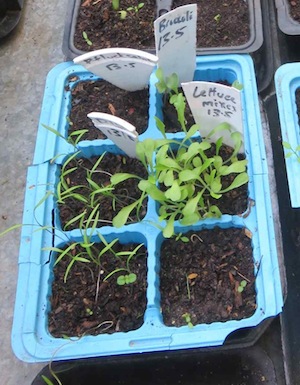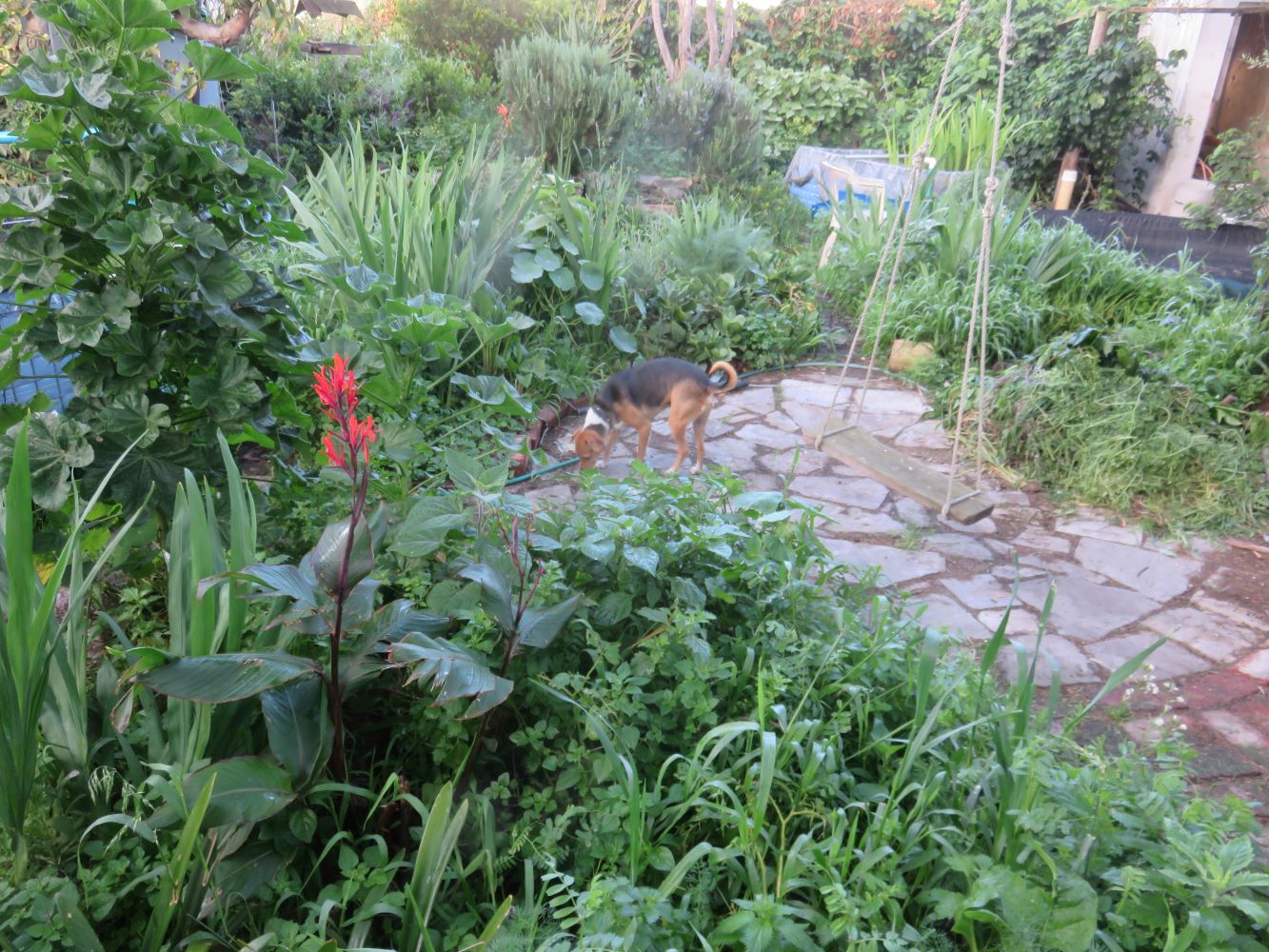Dear Reader, in this age of AI created content, please support with your goodwill someone who works harder to provide the human-made. Sign up in the righthand column or bottom of this page. You will receive my hand illustrated monthly newsletter RESTORE NATURE and access to the biodiversity garden design course as I write...and nothing else, I respect your time.
Growing lettuce
and what to do about bolting
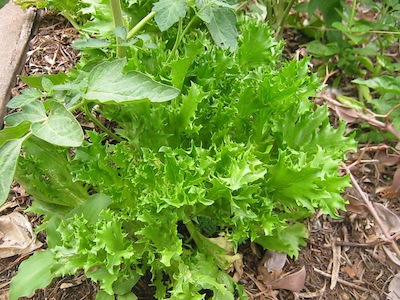 freshness on the go with growing lettuce in the garden
freshness on the go with growing lettuce in the gardenLettuce: another 'easy' leaf vegetable
Growing lettuce is relatively easy, so I’m putting lettuce with the easy vegetables because its one of those leaf vegetables that can be classed as a winter crop. When chard will not germinate in our Cape winter, lettuce will.
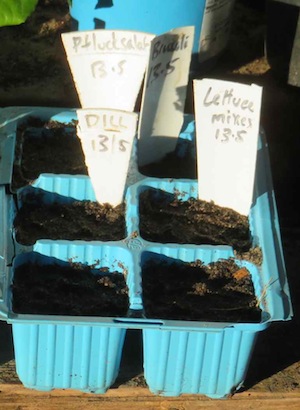 Lettuce seeds sown. A simple job
Lettuce seeds sown. A simple jobThe simple 'how to' of growing lettuce
To grow lettuce in winter, simply sow it in pre-wetted potting soil, cover the seeds with a thin 2mm layer of fine sifted material, water in with a delicate fine sprinkler and continue to sprinkle daily till it germinates in a week to a fortnight depending on weather and other conditions. At the four leaf stage pick it out and transplant to group 2 or 3 plants in a larger pot the size of a large mug, with more compost in the mix. Water for a week and then slowly expose it to more sunshine. Plant the lettuce seedlings out in the garden when the plants are robust, so they hit the ground running.
I am in the process of changing this classic old fashioned system for growing seedlings with one used by an Australian permaculturist. The aim of the exercise is to eliminate transplanting shock completely, so that the plants keep growing in a continuum instead of ‘sitting still’ for weeks at a time, which is worsened by cold weather. I will write on this as soon as my easy vegetable series is done and there is more 'proof', or stuff to photograph in the garden that was raised this way.
Is growing lettuce really easy ?
What makes lettuce less ‘easy’ is that the spring warmth also reduces your crop. As soon as the days go over 24 degrees C, lettuce will shoot and go to seed. The downside for the gardener is that the leaves become acridly bitter. In the garden one can observe something eerie and strange with lettuce. It is as though the lettuce plants in the shade seem to communicate with their Sistren in the sun by some invisible means and time their flowering to coincide, in one glorious flourish. The new research coming out on plant ‘communication’ through chemical messages and mycorrhiza makes this seem less far fetched.
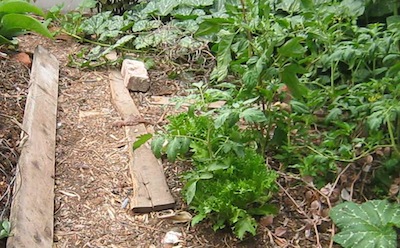 lettuce growing in summer in afternoon shade with tomatoes, basil and pumpkins. It bolted soon.
lettuce growing in summer in afternoon shade with tomatoes, basil and pumpkins. It bolted soon.What to do about bolting when growing lettuce
My teacher advised that to prevent lettuce bolting in the intense Cape summer heat, it should be planted in partial shade or filtered light under net, from November onwards. That is the beginning of our summer’s long sunlight hours, but by February the heat is oppressive.
Remove all bolting plants from the garden, and remove the whole plant, not just the shoot in the middle with the elongated nodes. Also remove it the minute you notice lengthening nodes, don’t wait for the stalk to protrude way above the rest of the leaves, or for flower buds to form. Spinach, lettuce, mustard and Chinese cabbage are all prone to bolting when warm weather comes. The ‘message’ to procreate gets around by some mysterious means and once plants in your garden start bolting it is irreversible and time to replace your winter crops with summer crops, according to the garden website link below.
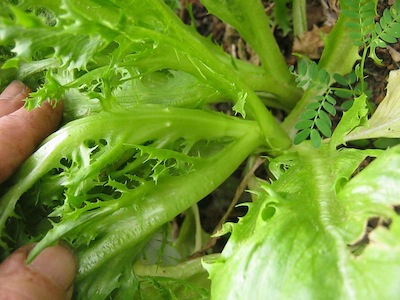 Lettuce showing the slight node lengthening which signals coming sexual reproduction or bolting
Lettuce showing the slight node lengthening which signals coming sexual reproduction or boltingThe up-side of bolting lettuce
When you finally surrender to the inevitable, leave some of
the choicest plants to flower and produce seed and harvest it for the next
season.
Next season you may find some reversions to type, what looks a bit like wild lettuce in your garden, a long legged dandelion like plant with small flowers. It is probably not the original wild lettuce Lactuca virosa, which is a medicinal plant, but the name ‘virosa’ means poisonous, so I would be cautious with eating it. I’ve read of quite a few cases of toxicity from consuming wild lettuce.
------
home page for links to useful practical information on numerous natural gardening topics
------
vegetable gardening the low cost, natural way, with a list of easy to grow veggies
------
some more details about bolting lettuce
------
wild lettuce the medicinal plant
You’re a home gardener ! Share your experiences and questions !
We all know about home gardening. Tell us about your successes, challenges and ask about issues that bother you. You may have the luxury of a back garden, but there are other ways we learn. Few people age without growing something or buying vegetables during their lives ! It is absolutely guaranteed that you have learned things which can help others on their gardening journey.
We invite you to share your stories, ask questions, because if a thing has bothered you it will bother others too. Someone may have a solution ! No question is too small. There is learning for everyone involved, for you, for me (yes, I learn from every question), for us all. Exciting stuff !
We are starting on a new journey. Every week we will profile your letters ! The best stories and questions we receive.
What Other Visitors Have Said
Click below to see contributions from other visitors to this page...
simple but sublime green foods Not rated yet
On the village square on a Saturday morning in my husband’s home town, you will find all kinds of green vegetables, like Pflucksalat and Mangold (Chard) …
Restore Nature Newsletter
I've been writing for four years now and I would love to hear from you
Please let me know if you have any questions, comments or stories to share on gardening, permaculture, regenerative agriculture, food forests, natural gardening, do nothing gardening, observations about pests and diseases, foraging, dealing with and using weeds constructively, composting and going offgrid.
SEARCH
Order the Kindle E-book for the SPECIAL PRICE of only
Prices valid till 30.09.2023
Recent Articles
-
garden for life is a blog about saving the earth one garden at a time
Apr 18, 25 01:18 PM
The garden for life blog has short articles on gardening for biodiversity with native plants and regenerating soil for climate amelioration and nutritious food -
Cape Flats Sand Fynbos, Cape Town's most endangered native vegetation!
Apr 18, 25 10:36 AM
Cape Flats Sand Fynbos, a vegetation type found in the super diverse Cape Fynbos region is threatened by Cape Town's urban development and invasive alien plants -
Geography Research Task
Jan 31, 25 11:37 PM
To whom it may concern My name is Tanyaradzwa Madziwa and I am a matric student at Springfield Convent School. As part of our geography syllabus for this
"How to start a profitable worm business on a shoestring budget
Order a printed copy from "Amazon" at the SPECIAL PRICE of only
or a digital version from the "Kindle" store at the SPECIAL PRICE of only
Prices valid till 30.09.2023
